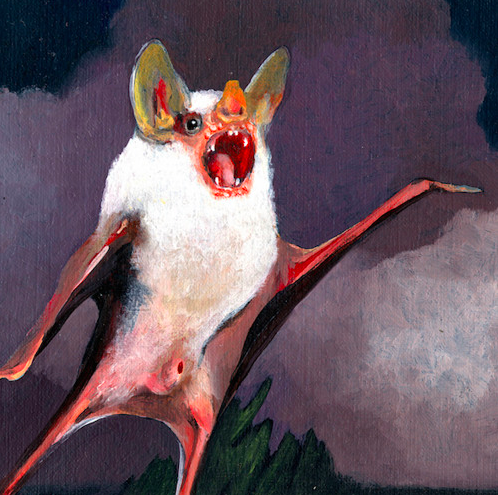It’s not often you come across albums that are professedly inspired by vampirism. Yet such is the case with the third LP from Italian production duo Ninos du Brasil, Vida Eterna. Adorned with cover art from British artist Marvin Gaye Chetwynd’s Bat Opera series, the oil-painted, fang-bearing bat that stares out at the listener heralds a nocturnal journey into eight tracks of industrial techno, leering vocals, and Brazilian batucada.
Nico Vascellari and Nicolo Fortuni met amid the frantic performances of the 90s punk scene, both playing in the band With Love, and they bring a punkish disregard for categorisations or commercial pressures to their work as Ninos du Brasil. The pair are both also successful visual artists. Hence in Vida Eterna the aesthetic meets the brutal and unforgiving, and narrative structure meets ambiguity and obfuscation.
Opener ‘O Vento Chama Seu Nome’ – ‘The Wind Calls Your Name’ in Portuguese – places the listener directly in the warped vampiric naturalism of the record’s cover art, combining an undulating, bass-heavy samba rhythm with eerily whispered vocals that evoke the mood. It is seamlessly sequenced into ‘No Meio Da Noite’, where the batucada samba rhythms come to the fore as vocals effervesce and techno influences emerge in the acid sounds of a Roland TB-303 synth.
As Vida Eterna progresses, Ninos du Brasil’s productions deepen and darken. On ‘Condenado Por Un Idioma Desconhecido’ (‘Convicted for an Unknown Language’), Vascellari and Fortuni’s punk heritage manifests in the screamed vocal, frenzied over a percussive backing. Through their distorting and appropriation of Brazilian batucada, Vascellari and Fortuna formulate an ‘unknown language’ of their own, one that is fresh and one which obscures the music’s original specificity.
Ninos Du Brasil are a live act as much as recording artists, and much of Vida Eterna is clearly designed for the visceral performances that they’ve become known for. Part-sweat, part-confetti, part-strobe, the maximal sensory catharsis of their live shows is expressed in the chaos of ‘A Magia Do Rei II’. Here, Vascellari’s rhythmic vocalisations mirror the cowbell clave while a seething bassline and top-line synth wash over. It is in these moments that Ninos are at their most effective, forcing the listener into their cataclysmic space.
In moments of relative quiet, Ninos lose their enticing force. ‘O Som De Ossos’ fails to reach a satisfying conclusion, undulating on the same rhythmic motif, while Arto Lindsay’s soft vocals on the closing track ‘Vagalumes Piralampos’ are a jarring presence, slowing the record’s momentum.
Vida Eterna is an admirable maturation of the Ninos du Brasil sound. Taking the project into more club-focused territory, the duo lean less heavily on their fascination with Brazilian culture and instead play off their own histories, creating a percussive self-expression on their own terms.


